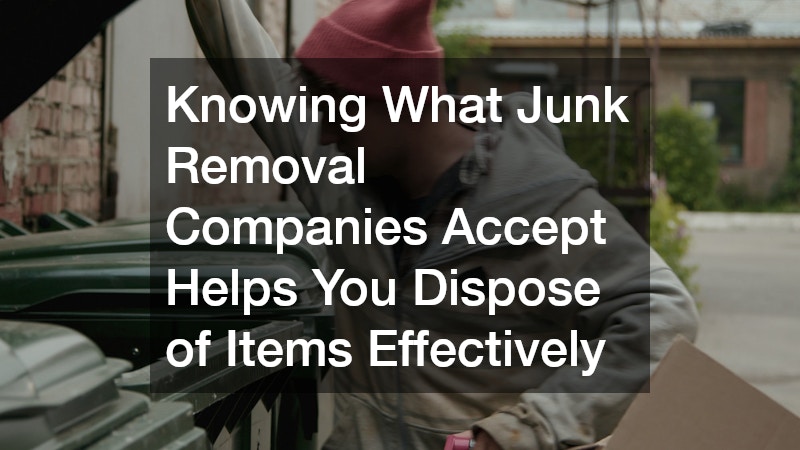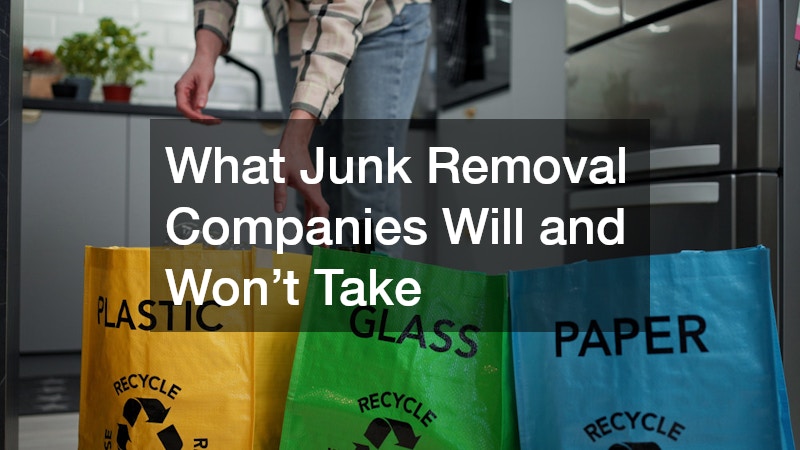Understanding what items junk removal companies will or won’t take is crucial for anyone looking to declutter. This guide will delve into common questions about junk removal services and offer practical insights into what you can expect when hiring a company to dispose of your unwanted items.
What Items Do Junk Removal Companies Commonly Accept?
Types of Household Items
Most junk removal companies readily accept a variety of common household items. Furniture items like sofas, chairs, and tables are often welcome as they are easy to handle and transport.
Additionally, junk removal services commonly accept appliances such as refrigerators, ovens, and dishwashers. Companies are equipped to handle these bulky items because they have the necessary tools and transportation capabilities.
Smaller household items like carpets, rugs, and mattresses are also typically accepted. By offering a wide acceptance of household belongings, junk removal services help individuals declutter efficiently.
Electronics and E-Waste
When it comes to electronic waste, many junk removal companies emphasize responsible recycling. They understand the importance of handling e-waste carefully to prevent environmental damage.
Items such as old televisions, computers, and cell phones can generally be accepted, but they must be disposed of in accordance with specific regulations. Companies often collaborate with e-waste recycling facilities to ensure the safe disposal of these items.
The emphasis on e-waste recycling reflects a broader commitment to environmental responsibility. Customers are encouraged to inquire about specific e-waste policies when scheduling a pick-up.
What Materials Are Generally Refused?
Hazardous Materials
Junk removal companies typically refuse to handle hazardous materials due to safety and regulatory reasons. Materials such as asbestos, lead-based paints, and chemicals are considered too dangerous for transport and disposal by general services.
Handling these materials often requires specialized training and equipment to ensure public safety and environmental protection. Customers should seek specialized services for the proper disposal of hazardous materials.
Local waste management services or environmental agencies can provide guidance on how to dispose of these types of waste responsibly. Understanding these limitations helps in planning effective junk removal services.
Construction Debris
There is a general tendency for junk removal companies to refuse certain types of construction debris. Items such as large chunks of concrete, bricks, and drywall are usually not taken due to their weight and volume.
Some companies might accept small amounts of construction debris, but larger projects often require specialized waste management solutions. Alternatives may include renting a dumpster or finding a company that specializes in construction waste removal.
It is important to confirm with the junk removal company beforehand to understand their policies on construction debris. This ensures efficient planning in the disposal of construction-related waste.
How Do Junk Removal Companies Handle Donations?
Partnerships with Charities
Many junk removal companies have established partnerships with charitable organizations. This collaboration allows for the donation of gently used items to individuals and families in need.
Such partnerships not only provide a second life for items but also contribute positively to community support efforts. Customers are encouraged to discuss donation options with companies to maximize the impact of their discarded items.
Through these initiatives, companies foster a culture of recycling and reuse. This dual approach supports both decluttering efforts and broader social causes.
Items Typically Donated
The items most suitable for donation are those in relatively good condition. Furniture, clothes, and small appliances that remain functional and presentable are often collected for donation purposes.
Junk removal companies sort items to determine which can be redirected to local charities. Customers should express an interest in donation at the onset to ensure appropriate handling and logistics.
This preemptive identification of donatable items can drive greater environmental and social benefits from the junk removal process. Resultantly, thoughtful disposal decisions can amplify the positive impact of decluttering efforts.
What Should You Know About Specialty Item Disposal?
Disposing of Large Appliances
The disposal of large appliances often involves additional costs or scheduling requirements. Many companies charge an extra fee for items like refrigerators or washing machines due to labor-intensive handling.
Some regulations require the proper dismantling of appliances before disposal to ensure safe and efficient processing. Junk removal services familiar with these rules can streamline the removal process.
Confirming any extra charges or procedures prior to hiring a service can prevent surprises during collection. This foresight ensures a smooth removal experience for cumbersome items.
Handling of Yard Waste
Junk removal companies may have differing policies regarding yard waste removal. Some services accept general green waste like leaves and branches, while others may have specific conditions.
Understanding these nuances can be crucial for effective yard waste disposal planning. Consultation with removal services helps clarify yard waste collection specifics and scheduling arrangements.
This knowledge allows for informed decisions when seeking help for garden or landscaping decluttering. Ultimately, a customized approach aligns your needs with available services for optimal outcomes.
By understanding what junk removal companies will and won’t take, you can better prepare for getting rid of your unwanted items effectively and responsibly. Whether it’s understanding the range of acceptable items or seeking alternative disposal methods, this knowledge empowers you to make informed decisions when decluttering your space.




